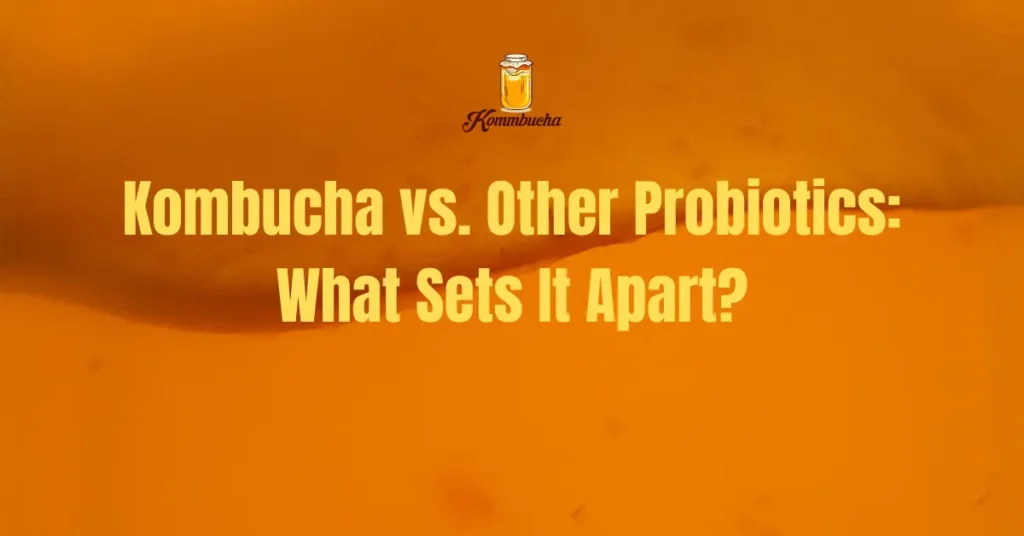Probiotics are celebrated for their benefits to gut health, but with so many options available, it can be challenging to choose the right one for you. Kombucha has gained popularity as a flavorful, fermented tea with potential health benefits. But how does it compare to other probiotic sources like yogurt, kefir, and supplements? Let’s explore what makes kombucha unique and how it stands out from the crowd.
What Makes Kombucha Unique?
Kombucha is not just a probiotic drink; Kombucha is a fermented tea created with a special culture known as SCOBY (Symbiotic Culture of Bacteria and Yeast). This unique fermentation process results in a beverage that offers a blend of beneficial bacteria, yeast, organic acids, and antioxidants. But here’s what sets kombucha apart:
- Diverse Microbiome: Kombucha’s fermentation involves both bacteria and yeast, leading to a complex microbiome. This diversity can potentially offer a broader range of probiotic benefits compared to single-strain products like yogurt. According to the National Center for Complementary and Integrative Health (NCCIH), a diverse array of probiotics can be beneficial for gut health.
- Natural Detoxification: Kombucha contains organic acids like acetic and gluconic acid, which can aid in natural detoxification processes. This might offer additional benefits beyond gut health, such as improved liver function and enhanced digestion.
- Low Sugar Alternatives: Many commercial kombucha brands offer low-sugar options, which can be a healthier choice compared to some flavored yogurts and kefirs that may contain added sugars.
Kombucha vs. Yogurt: A Different Probiotic Experience
Yogurt is a well-known probiotic source made from fermented milk. While it’s a great source of beneficial bacteria, here’s how kombucha differs:
- Probiotic Variety: Kombucha fermentation introduces both bacteria and yeast, offering a wider range of probiotics. Yogurt typically contains specific bacterial strains like Lactobacillus and Bifidobacterium, which are beneficial but less diverse.
- Acidity and Flavor: Kombucha’s natural fizz and tanginess come from the fermentation process, while yogurt’s tang is usually less pronounced. The unique flavor profile of kombucha can be a refreshing change from traditional probiotic foods.
- Vegan and Dairy-Free: Kombucha is a vegan-friendly alternative to dairy-based probiotics. This makes it accessible to those with dairy allergies or those following a plant-based diet.
Kombucha vs. Kefir: Comparing Fermented Beverages
Kefir is another fermented drink, made from milk or water and kefir grains. Here’s how kombucha and kefir compare:
- Microbial Composition: Kefir contains a unique combination of bacteria and yeast, similar to kombucha, but the specific strains differ. Kefir grains also introduce different microorganisms that contribute to its health benefits.
- Alcohol Content: Kombucha contains a small amount of alcohol due to fermentation (usually less than 0.5% ABV), which is generally absent in kefir. While the alcohol content in kombucha is low, it’s something to consider for those avoiding any alcohol.
- Texture and Taste: Kombucha is typically carbonated and effervescent, providing a fizzy, refreshing drink. Kefir has a creamy texture and can be either carbonated or still, offering a different sensory experience.
Kombucha vs. Probiotic Supplements: The Supplemental Option
Probiotic supplements come in various forms, including capsules, tablets, and powders. Here’s how they stack up against kombucha:
- Controlled Strains: Probiotic supplements often contain specific, well-researched strains of probiotics in precise doses, making them a targeted approach for gut health. Kombucha’s probiotic content can be less predictable due to natural variations in fermentation.
- Convenience: Supplements offer convenience and dosage control that kombucha doesn’t. They are portable and can be taken without the need for refrigeration.
- Additional Benefits: Kombucha provides not only probiotics but also antioxidants and organic acids, offering a broader spectrum of potential health benefits compared to standard probiotic supplements.
Conclusion: Finding the Right Probiotic for You
Kombucha, yogurt, kefir, and probiotic supplements each offer unique benefits and characteristics. Kombucha stands out for its diverse probiotic profile, natural detoxification properties, and vegan-friendly status. According to the Mayo Clinic, understanding these differences can help you make an informed choice for your health. Explore these options to find what best fits your lifestyle and health goals.

